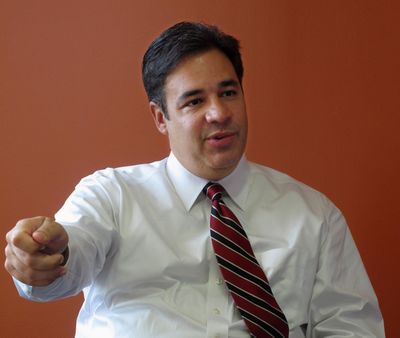Refugee bill would give Congress the clout

WASHINGTON – The House Judiciary Committee voted Wednesday to approve a bill that would give Congress, not the president, the final say on how many refugees could legally resettle in the United States.
Supporters of the legislation said a new law is needed because states now have no power to block the federal government’s resettlement plans if they object to them.
Rep. Raul Labrador, an Idaho Republican and the bill’s chief sponsor, told the panel that the current system suffers from “unchecked executive authority” and allows Syrian refugees to enter the country without proper screening.
“The simple fact is that we do not know who these people truly are,” Labrador said.
Under Labrador’s plan, which passed on a vote of 18-9, Congress would not allow the United States to admit more than 60,000 refugees from around the world each year. That’s a drop of about 30 percent from the current yearly maximum of 85,000 set by President Barack Obama.
The vote reignited a controversy that began last year when Obama proposed allowing 10,000 Syrian refugees into the country. Critics feared the White House plan would make it easier for terrorists to sneak into the country by exploiting gaps in the refugee program, while backers said the U.S. has had a long and proud history of welcoming foreigners seeking to escape hostile conditions.
Rep. Suzan DelBene, a Washington state Democrat who sits on the committee, said Labrador and other backers of the bill were “perpetuating hateful, xenophobic sentiments” and treating refugees like criminals.
“Many refugees are women and children fleeing violent situations,” she said. “They are simply looking for a safe place to go. We don’t need to close our doors to refugees to keep Americans safe. That’s not who we are as a nation.”
Rep. John Conyers of Michigan, the top Democrat on the House Judiciary Committee, called the bill “mean-spirited legislation” that would allow states to turn away refugees while setting an artificially low cap on the number of refugees, forcing the United States to reject people trying to flee persecution. He likened the bill to proposals by Republican front-runner Donald Trump to build a wall at the U.S.-Mexican border or ban Muslims from entering the country.
“We are in the midst of a global refugee crisis. These are the world’s most vulnerable,” Conyers said.
While the issue has sharply divided both Congress and the country, little has changed on Capitol Hill.
The GOP-led House first voted late last year to put temporary brakes on the president’s plan to admit more Syrian refugees. But the Senate then backed Obama in January, when Republicans couldn’t come up with enough votes to pass the House plan and stop a Democratic filibuster.
At a three-hour hearing on Wednesday, Labrador and other backers made clear that they intend to continue pressing their plan to limit refugees, even though it could once again face an uphill fight in the Senate.
Labrador, who practiced immigration law in Idaho before entering politics, said his bill, called the Refugee Program Integrity Restoration Act, would give Congress more power while protecting against fraud and require the rejection of any refugees convicted of serious crimes.
“It restores congressional power and respects the decisions of elected officials closest to the people,” said Labrador, the vice chairman of the House immigration and border security subcommittee.
He and others said the current system is unfair because it only requires the president to consult with Congress, while ultimately allowing the executive branch to decide how many refugees to admit.
By giving all the power to the White House, “the American people have little say in the process,” said House Judiciary Committee Chairman Bob Goodlatte of Virginia, one of seven Republicans co-sponsoring Labrador’s bill.
“Considering the terrorist threats facing our nation, we have a right to be concerned about resettlement of refugees from countries that are hotbeds of terrorist activity,” he said.
DelBene tried to change the bill by removing a provision that would authorize three years of surveillance for refugees admitted to the United States, but the committee rejected her amendment. She pointed out the U.S. already screens all refugees before they’re allowed to enter the country.
But Labrador said that there’s little reliable U.S. intelligence in Syria, making it impossible to know with certainty whether refugees pose a serious threat.
His bill now heads to the full House for a vote.